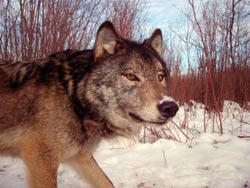What Should Be Done About the Wolves?

Michigan Technological University<br> <br>Closeup of an Isle Royale National Park wolf.<br>
Michigan Tech researchers John Vucetich and Rolf Peterson and Michigan State University environmental ethicist Michael Nelson are willing to tackle this controversial subject.
The issue is a prickly one because there is conflict among environmentalists and ethicists about how we should—or should not—relate to nature and the environment. Some say, “let nature take its course.” Others believe humans should work to maintain ecosystem health, and that may on some occasions require intervention.
“The appropriate approach is to acknowledge and understand all the values at stake, and then develop a perspective or position that would least infringe upon that set of values,” say Vucetich, Peterson and Nelson.
There are three possible kinds of intervention that could save the wolves of Isle Royale:
* Wolf reintroduction—reintroducing wolves if the present wolf population were to go extinct.
* Female reintroduction—reintroducing female wolves when all present females have gone extinct.
* Genetic rescue—introducing new wolves on Isle Royale while some of the present population remains, to broaden and strengthen the gene pool.
If the wolves are allowed to go extinct, the moose population on the remote island will grow unimpeded, until the moose strip the island of its vegetation and eventually, starve.
“The bottom line is, as long as there are moose there, keep the wolves there,” says Vucetich.
“All things considered, if the wolves go to extinction, reintroduce them,” Peterson concludes.
See http://www.mtu.edu/news/stories/2012/march/story64989.html
Media Contact
More Information:
http://www.mtu.eduAll latest news from the category: Ecology, The Environment and Conservation
This complex theme deals primarily with interactions between organisms and the environmental factors that impact them, but to a greater extent between individual inanimate environmental factors.
innovations-report offers informative reports and articles on topics such as climate protection, landscape conservation, ecological systems, wildlife and nature parks and ecosystem efficiency and balance.
Newest articles

A universal framework for spatial biology
SpatialData is a freely accessible tool to unify and integrate data from different omics technologies accounting for spatial information, which can provide holistic insights into health and disease. Biological processes…

How complex biological processes arise
A $20 million grant from the U.S. National Science Foundation (NSF) will support the establishment and operation of the National Synthesis Center for Emergence in the Molecular and Cellular Sciences (NCEMS) at…

Airborne single-photon lidar system achieves high-resolution 3D imaging
Compact, low-power system opens doors for photon-efficient drone and satellite-based environmental monitoring and mapping. Researchers have developed a compact and lightweight single-photon airborne lidar system that can acquire high-resolution 3D…





















